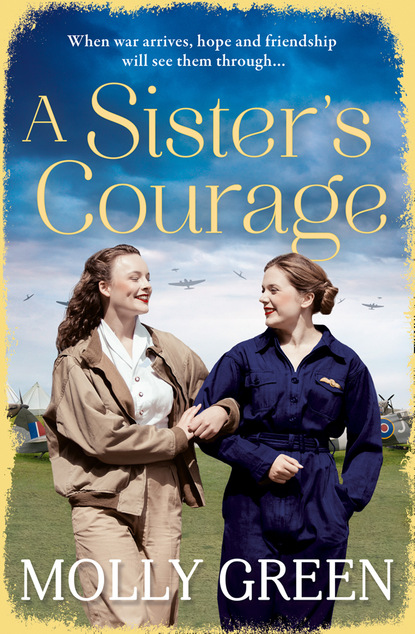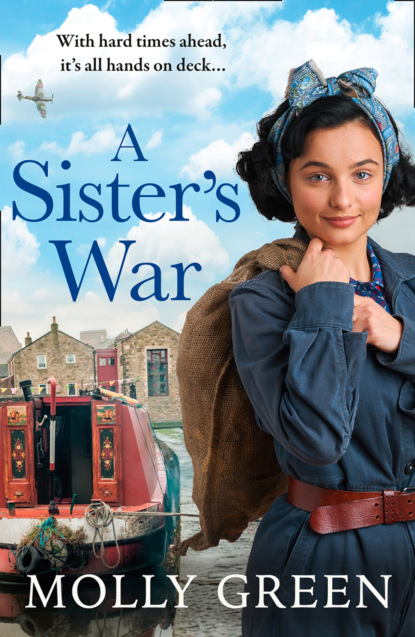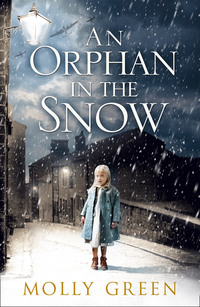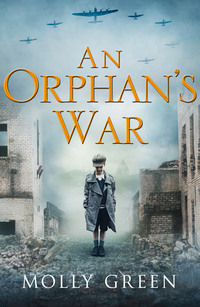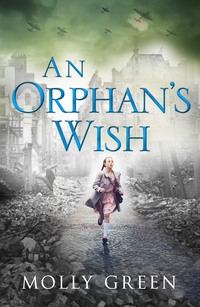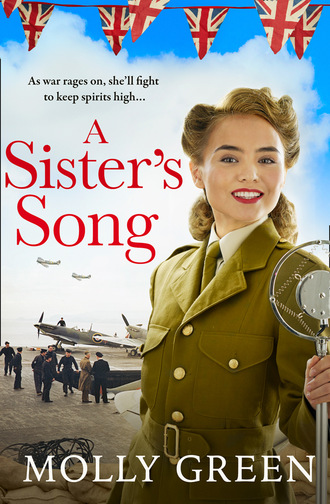
Полная версия
A Sister’s Song

A SISTER’S SONG
Molly Green

Copyright
Published by AVON
A Division of HarperCollinsPublishers Ltd
1 London Bridge Street
London SE1 9GF
www.harpercollins.co.uk
First published in Great Britain by HarperCollinsPublishers Ltd 2020
Copyright © Molly Green 2020
Cover design by Stephen Mulcahey © HarperCollinsPublishers Ltd 2020
Cover photographs © CollaborationJS, Fox Photos/Stringer/Getty Images (aircraft carrier in background)
Molly Green asserts the moral right to be identified as the author of this work.
A catalogue copy of this book is available from the British Library.
This novel is entirely a work of fiction. The names, characters and incidents portrayed in it are the work of the author’s imagination. Any resemblance to actual persons, living or dead, events or localities is entirely coincidental.
All rights reserved under International and Pan-American Copyright Conventions. By payment of the required fees, you have been granted the non-exclusive, non-transferable right to access and read the text of this ebook on screen. No part of this text may be reproduced, transmitted, downloaded, decompiled, reverse engineered, or stored in or introduced into any information storage and retrieval system, in any form or by any means, whether electronic or mechanical, now known or hereinafter invented, without the express written permission of HarperCollins.
Source ISBN: 9780008332471
Ebook Edition © June 2020 ISBN: 9780008332488
Version: 2020-06-09
Dedication
To the people of Malta who bravely endured
the Siege of Malta
from June 1940 – December 1942,
their Island being harder hit than the London Blitz,
and to the RAF, the Navy and the Merchant Navy who
defended the Island, sacrificing many,
but who won against all odds.
To all the entertainers in ENSA performing
throughout the Second World War
in Great Britain, Europe, the Middle East and the Far East.
The performers were often very close to
the action but carried on regardless,
keeping up the morale of the troops and
bringing them a little bit of Blighty.
Contents
Cover
Title Page
Copyright
Dedication
Chapter One
Chapter Two
Chapter Three
Chapter Four
Chapter Five
Chapter Six
Chapter Seven
Chapter Eight
Chapter Nine
Chapter Ten
Chapter Eleven
Chapter Twelve
Chapter Thirteen
Chapter Fourteen
Chapter Fifteen
Chapter Sixteen
Chapter Seventeen
Chapter Eighteen
Chapter Nineteen
Chapter Twenty
Chapter Twenty-One
Chapter Twenty-Two
Chapter Twenty-Three
Chapter Twenty-Four
Chapter Twenty-Five
Chapter Twenty-Six
Chapter Twenty-Seven
Chapter Twenty-Eight
Chapter Twenty-Nine
Chapter Thirty
Chapter Thirty-One
Chapter Thirty-Two
Chapter Thirty-Three
Chapter Thirty-Four
Chapter Thirty-Five
Chapter Thirty-Six
Chapter Thirty-Seven
Chapter Thirty-Eight
Chapter Thirty-Nine
Chapter Forty
Chapter Forty-One
Chapter Forty-Two
Chapter Forty-Three
Read on for an exclusive extract from the next Molly Green novel A Sister’s War
Acknowledgements
Author’s note
Reading List for A Sister’s Song
Acknowledgements of Extracts from the Songs Mentioned
Keep Reading …
About the Author
Also by Molly Green
About the Publisher
Chapter One
Downe, Near Bromley
Easter 1943
Suzanne stood in the wings of the village hall stage, poised to take her place by the other musicians. She couldn’t stop shivering. Although it was mild outside, the hall was always cold – but it wasn’t that. She had never before performed the solo in the finale of her favourite violin concerto in front of a real audience.
Oh, no – there was her cue.
Just go and do it, she told herself sternly, holding her violin tight to her chest. Despite her trembling legs, she walked up the three steps to the wooden platform. The eight other musicians turned their heads towards her as she nodded to them, then at the modest audience. She sat down, her fingers instinctively tracing the familiar curving outline of her instrument.
Even though Suzanne couldn’t see much in the gloom of the badly lit hall, she couldn’t mistake Maman. Swathed in her fur coat, which she refused to discard until May, her tiny hat perched on her curls, her mother sat in the front row on one of the hard chairs, no doubt on the cushion she always brought with her. But where was Ronnie? She should be by Maman’s side. But this was no time to start asking questions. The conductor looked at her with raised eyebrows. Suzanne settled her violin under her chin, took up her bow, and nodded.
As soon as she played the first notes she relaxed, now sure of herself. Barely aware of her surroundings, she half closed her eyes, the music filling her brain, her heart, and flowing through to the tips of her elegant fingers as the bow caressed the strings of her beloved violin.
Her whole being was immersed in Mendelssohn’s wonderful concerto when suddenly the wail of an air-raid siren stopped her in mid-stroke. Her heart jumped with fright. The sound rose and fell over and over again. She’d never heard one so close. Dear God, the Luftwaffe must be heading straight for Biggin Hill. Or Bromley. Or even Downe! Blood pounded through her temples. Her fingers fluttered. Would the hall be struck? Why weren’t people rushing out of the door?
Everyone on the platform stopped. Suzanne’s heartbeat sounded in her ears as she looked over to the audience. One tall man at the back immediately sprang up, caught her eye for a brief moment and nodded, then shoved his hat on and quickly left. He certainly wasn’t going to risk it by staying, and she couldn’t really blame him. Oh dear, there was Maman on her feet. Should she go to her? No one else moved. They sat quietly on the hard seats, faces upturned, as though expecting to hear the rest of the piece. To her relief she saw her mother look round at the others and quickly sit down again. Suzanne glanced at Mr Rubenstein, the elderly conductor, who tapped on his stand and said:
‘Back to the beginning of the solo, please, ladies and gentlemen.’
There was nothing for it but to obey. She nodded, her hand shaking as she took up her bow, waiting for her introduction.
Just as she was about to begin, the siren started up again. This time the audience stirred. Although the wailing probably lasted no more than a minute, it felt to Suzanne like an hour. Then a silence. The tension in the hall suddenly tightened as a droning noise, followed by a high-pitched whine – different from the siren – sounded overhead. BOOM! An explosion rattled her eardrums as the very platform she sat on shook with the vibration. She couldn’t move.
Then a deafening bang and the shattering of glass. Suzanne gasped. Dear God, they were all going to be killed! Her heart pounded. Her chest felt so tight that for long seconds she couldn’t breathe. What should she do? What were the others going to do? Squashing the feeling of panic she saw heads and hats turn briefly towards the two smashed windows, then back again to the small orchestra. Still no one else got up to leave. Mr Rubenstein gestured for Suzanne to continue.
Somehow the bravery of her audience transferred itself to her and she played the last section, her fear replaced by her love of the joyous music. Although still trembling, she poured her heart and soul out to the audience, letting the music flow and comfort them. She played the final note, completely spent.
There was a hush. Then the sound of applause echoed round the hall.
Her cheeks flushed with embarrassment at such an enthusiastic response, Suzanne faced the audience. She could see Maman clapping louder than anyone else, but it was strange that Ronnie hadn’t appeared. Suzanne knew her younger sister didn’t much care for classical music, but she’d said only this morning she’d be coming with Maman. Then it struck Suzanne why she wasn’t there.
Don’t let something have happened to Ronnie in the air raid.
Pushing down her unease she pasted a smile on her face for Maman and was rewarded by the little hat bobbing up and down as her mother waved and blew kisses in her daughter’s direction.
Mr Rubenstein gave a bow and gestured to Suzanne. Still shaken from the noise of the bombs she bent forward and briefly lowered her head. Next, the other musicians stood, looking towards her, clapping and smiling.
And then the whine of another siren filled the hall, but this time it built to a high crescendo and wailed for more than a minute. Suzanne breathed out slowly and smiled back at the musicians and then the audience. It was the welcome sound of the All Clear, practically swallowed up by more clapping and some loud whistles from the concertgoers.
‘That was close,’ Mr Rubenstein said, addressing the audience. ‘And we would have completely understood if you’d left for the shelter, so I want to thank you for having such faith that we would all come through this latest attack together.’
‘Bit like the Titanic,’ a man at the back called out. ‘The band kept playing even when the ship was sinking, so we thought we’d better stay, too.’
‘This in’t the first war for most of us,’ a large woman with a voice to match put in. ‘If London can take it, then so can Downe.’
There was laughter and cheers and more clapping, until the musicians sat down again and began to play the first notes of ‘God Save The King’. Immediately, the audience sprang to their feet and sang with even more gusto than usual.
People were still chattering as they trooped out of the village hall into the cool early April night.
‘Wasn’t that lovely?’ Suzanne heard Mrs Holmes, one of their neighbours, say to her friend. ‘Something beautiful to listen to … and almost spoilt by those dreadful Nazis. But they have us all wrong if they think we’re scared of them.’
‘Yes, I’m glad we stayed ’til the end,’ Mrs Holmes’s friend agreed, ‘but I wonder where those bombs dropped. Downe’s been lucky so far, though Bromley’s had its share.’ She clicked her teeth. ‘Well, we’ll soon know what damage they’ve done, that’s for certain.’
‘Maman.’ Suzanne turned to her mother who was gripping her arm. ‘Constable Mason is over by the door. I’m going to have a word with him.’
‘I wish to go straight home and find out what has happened to Véronique.’
So Maman was worried as well.
‘I want to ask if he’s seen her, so just wait a moment … please, Maman.’
‘Very well. But do not keep me waiting.’
Suzanne broke from her mother’s grasp and hurried over.
‘Oh, Mr Mason, do you know if anyone was hurt in that raid just now? I’m worried about Ronnie – you know, my young sister.’
‘No one ’urt, miss, as far as I know. They all got safely into the shelter – except all of you in the village hall,’ he added. ‘You want to think yourselves lucky you and your ma didn’t come a cropper.’
‘But have you seen Ronnie?’ Suzanne persisted. ‘You know – Véronique.’
‘Not that I remember.’ PC Mason stroked his chin, making a rasping noise. ‘Mind you, they was all packed in tight so I might have overlooked her. She’s smaller than you and your other sister, in’t she?’
Suzanne nodded. ‘I can’t help being worried because she was supposed to have come to the concert this evening.’
‘I ’aven’t ’eard nothing to the contrary,’ the constable said. ‘Lucky the bombs all dropped in the field, so no real damage, thank Gawd. Even the cows and horses was spared, so I shouldn’t worry too much.’
Suzanne thanked him and turned to see Maman hovering behind her, impatiently tapping her foot.
‘What did he say?’ Simone demanded. ‘Has he seen Véronique?’
‘No, but he said everyone got into the shelter and no one was hurt.’
As far as I know, PC Mason had added. Suzanne swallowed. She didn’t want to alarm her mother, but she wouldn’t feel happy until she saw her sister, unharmed, with her own eyes.
‘That is a relief.’ Maman dabbed her eyes with a pristine handkerchief. ‘You made me worry for a moment. Let us go home and put the kettle on.’
‘You sound like a real Englishwoman,’ Suzanne said, smiling, as she tucked her arm through her mother’s for the short walk to the Victorian cottage that was home.
‘That is not a compliment for me,’ Simone admonished, the cloth bag holding her cushion looking like an elegant accessory as it dangled from her wrist. She stepped along the pavement, her high heels tapping rhythmically.
‘Just teasing, Maman. I know you’re French through and through and could never pretend otherwise.’
Her mother flashed her a smile of forgiveness. ‘I do not understand teasing, as you well know, Suzanne, but if you say it was only a joke, I will believe you.’
The whole way home Simone went over and over the unexpected air raid, each exclamation more dramatic than the one before.
‘Mr Rubenstein was taking a bad risk. We could all be dead now.’ Her mother increased her walking pace. ‘I want to see my little Véronique – to know she is safe.’
‘She told me she was coming with you.’
‘She told me the same.’ Simone’s breath came in short bursts. ‘And I do wish you would call her by her proper name, Suzanne. How many times do I ask you?’
‘She doesn’t like being called Véronique,’ Suzanne said. ‘You know what a tomboy she is, and she doesn’t feel it suits her. In a way, she’s right, but she’ll change when she’s a bit older and starts to notice the boys.’
‘She should be proud of her name,’ Simone said. ‘I gave you all beautiful French names and she and Lorraine refuse to use them.’ She glanced at Suzanne. ‘At least you do not call yourself Suzy like your sisters do. If you did, I would be very upset.’
‘Did you see Ronnie before you left?’ Suzanne asked, wanting to change the subject about their names that Maman brought up time and time again. She was resolute in trying to work out what could have happened to Ronnie.
‘She came in from a walk. I told her to wash her face and change into something presentable, but that I must leave so I am not late.’ She shook her head. ‘Sometimes I cannot believe my own daughter finds it so hard to wear anything suitable. Perhaps she decided to remain at home.’
‘I don’t think that would be her reason,’ Suzanne said worriedly. ‘She doesn’t really care about whether she’s dressed appropriately or not.’
‘Well, she should.’ Simone’s tone was non-compromising when it came to fashion and appearances.
‘I do hope she found somewhere safe in the air raid.’ Suzanne bit her lip. ‘But if she’d started out for the village hall and heard the siren, she didn’t go into the shelter – at least, Constable Mason couldn’t remember seeing her there.’
‘She knows to go under the dining table,’ her mother said firmly. ‘That is where we will find her.’
Suzanne gripped her violin case closer to her side, and unable to ignore the knot of anxiety growing in her stomach, prayed silently that her mother was right.
They heard a dog barking as they walked up the path to the front door.
‘That noise is coming from inside our house,’ Simone said, annoyance coating her words. ‘If Véronique has brought in a dog—’
Her mother didn’t finish her sentence but unlocked the front door. Suzanne followed her in, only pausing to flick the lock. She heard muffled sounds coming from the kitchen as though an animal was being smothered. Then she heard her sister say, ‘They’re home, so be a good boy.’
Simone turned to Suzanne. ‘There is a dog in there. I will not enter the kitchen until it goes. You can tell your sister. You will have to find your own supper. For me, I am not hungry.’
Suzanne pushed the door open and there was Ronnie sitting on a chair with a dog straddled across her knees. Its tail was wagging feebly. They both looked up at her entrance and Suzanne couldn’t help smiling. The dog’s head was cocked at the same angle as her sister’s, and the two pairs of eyes shone.
‘This is Rusty.’ Ronnie beamed. ‘Isn’t it the perfect name for him? It matches the colour of his head.’ She caught hold of the dog’s paw and gave a pretence of waving at Suzanne. ‘See, he knows his name already.’ The dog licked Ronnie’s hand. ‘Sorry I can’t get up. He’s rather weighing me down.’ She sighed happily.
Suzanne knelt by the chair and stroked the dog’s head, which could possibly have been described as rust-coloured once upon a time, together with a few rusty patches on an otherwise unkempt white coat. His shaggy fringe flopped into sunken eyes, now looking a little worried, or so Suzanne fancied, and his over-long ears sagged forlornly.
‘Hello, boy,’ she said. ‘Where’ve you come from?’
‘You won’t believe it,’ Ronnie said. ‘I started out for the village hall soon after Maman, but I got caught in the air raid. It was very near.’ She looked at Suzanne. ‘You must have heard it.’
‘Yes, we did,’ Suzanne said, looking at her sister anxiously. ‘Are you all right?’
‘I am now, but Rusty wasn’t.’ Ronnie stroked the dog’s head. ‘The warden spotted him – not our usual one but someone younger and so nice. Tall, dark and handsome. At least I imagine he was dark under his hat.’ She giggled. ‘Anyway, he picked Rusty up but I could see he was trying to stop some children from panicking, so I took the dog out of his arms and said I’d look after him. The poor little thing was trembling with fright. Anyway, we all rushed down the shelter steps. I knew you and Maman would be in the shelter by the village hall so I didn’t feel quite so bad that I’d missed the concert.’
‘Funnily enough, no one left,’ Suzanne said.
Ronnie’s mouth fell open. ‘Really? You mean they all stayed even after the bombs fell?’
‘Yes,’ Suzanne said, then remembered the tall man at the back. ‘Well, all except one man.’ She remembered how he’d given her a kind of apologetic nod. ‘Two of the windows shattered,’ she went on. ‘That gave us all quite a scare. I thought everyone would dash out, but they didn’t – even Maman stayed, and you know how frightened she gets.’ She stroked the dog’s head. ‘But I don’t know what we’re going to do about you, Rusty. Maman won’t allow you to stay – that’s definite.’
Rusty gave a little whine as though appealing to the two girls.
‘I’ve given him a bit of Maman’s leftovers and he scoffed it down as though he was starving.’ Ronnie suddenly grinned. ‘He wasn’t at all critical of Maman’s cooking.’
Suzanne smiled back, but when she studied the dog her expression changed. ‘He is starving,’ she said. ‘He looks pitiful.’
‘But he’s such a dear little fellow, and so grateful now he’s found me,’ Ronnie said, her face serious as she gently stroked the thin body. She looked up and sighed. ‘I’m sorry I didn’t come to your concert, Suzy, but I couldn’t leave him. Did you remember all your notes?’
Suzanne nodded. ‘Thankfully, yes. And everyone seemed to enjoy it.’
‘Oh, that’s good.’ Ronnie lowered her voice. ‘I knew Maman would be furious about Rusty, so I put him in the shed in a cardboard box with an old cushion, hoping after I’d fed him he’d go to sleep before she came in. Then I was worried about him and brought him back into the kitchen. It’s warmer in here for him. And Maman would have to see him sooner or later, but I thought you’d talk her round when you saw what a darling he is, and how he needs us. I know she’ll take notice of you to let me keep him because you’re her favourite.’
‘You and Raine are always going on about that, and it’s simply not true.’
‘What – being the favourite?’
‘Yes. She loves us all the same.’
‘Suzy, you’re so sweet but she doesn’t.’ Ronnie looked at her older sister pityingly. ‘Anyone can see that. But it doesn’t alter anything about Rusty. So will you have a word with her?’
‘Of course I’ll have a word,’ Suzanne said. ‘But you know how Maman is. Once she says no to something it’s difficult to persuade her to change her mind. And she does have a real fear of dogs.’
‘But not Rusty,’ Ronnie said firmly. ‘Who could possibly be frightened of him?’
Suzanne leaned across and twiddled Rusty’s ear. ‘Poor little chap,’ she said. ‘You must have thought you’d found a lovely new owner when Ronnie took you home, but I’m afraid it’s Maman you have to bring round to your way of thinking. And being French, she’s very stubborn.’
Rusty gave a short bark as if he understood.
‘You are calling me stubborn, Suzanne?’
The two sisters’ heads swivelled to the kitchen door where Simone stood quivering with anger.
‘Maman, the dog desperately needs some love and attention,’ Suzanne said. ‘Couldn’t you give him a chance if he behaves himself? He’d be company for you as well when we’re at school.’
‘I do not want the company of a dog,’ Simone snapped.
‘But, Maman—’
‘I have said you may not have a dog and you are going against my wishes.’
‘Suzy, please tell Maman—’
‘It is nothing of Suzanne’s business, Véronique,’ Simone rounded on her. ‘He is to go out – now!’
‘I can’t send him out,’ Ronnie said, looking up at her mother defiantly, and holding on to the dog even more firmly. ‘He’s hungry. Look at his ribs sticking out.’
‘I am not interested in his ribs,’ Simone said, stepping into the room. Rusty flinched and started to whine. Simone’s eyes darkened with anger. ‘This is the reason you do not attend your sister’s concert – because of some smelly dog with fleas. How could you, Véronique? To put a stray dog before your own sister.’
‘It wasn’t that,’ Ronnie protested. ‘I was already on my way until the siren went off. Anyway, Suzy understands – she loves animals too.’ She glared at her mother. ‘And he doesn’t smell, nor does he have fleas,’ she added indignantly. ‘But he does need my help … and I’m going to see he gets it.’
Simone pursed her lips. ‘As long as you are under my roof you will do as I say … and that goes for both of you. I do not like dogs and this one is not healthy.’ Her glance fell on the dog who was watching her. She quickly averted her eyes. ‘We have no money for medicine and we have no spare food for an animal. He must go to the vet. They will find him a home.’ She paused, her eyes sweeping over her two daughters.


